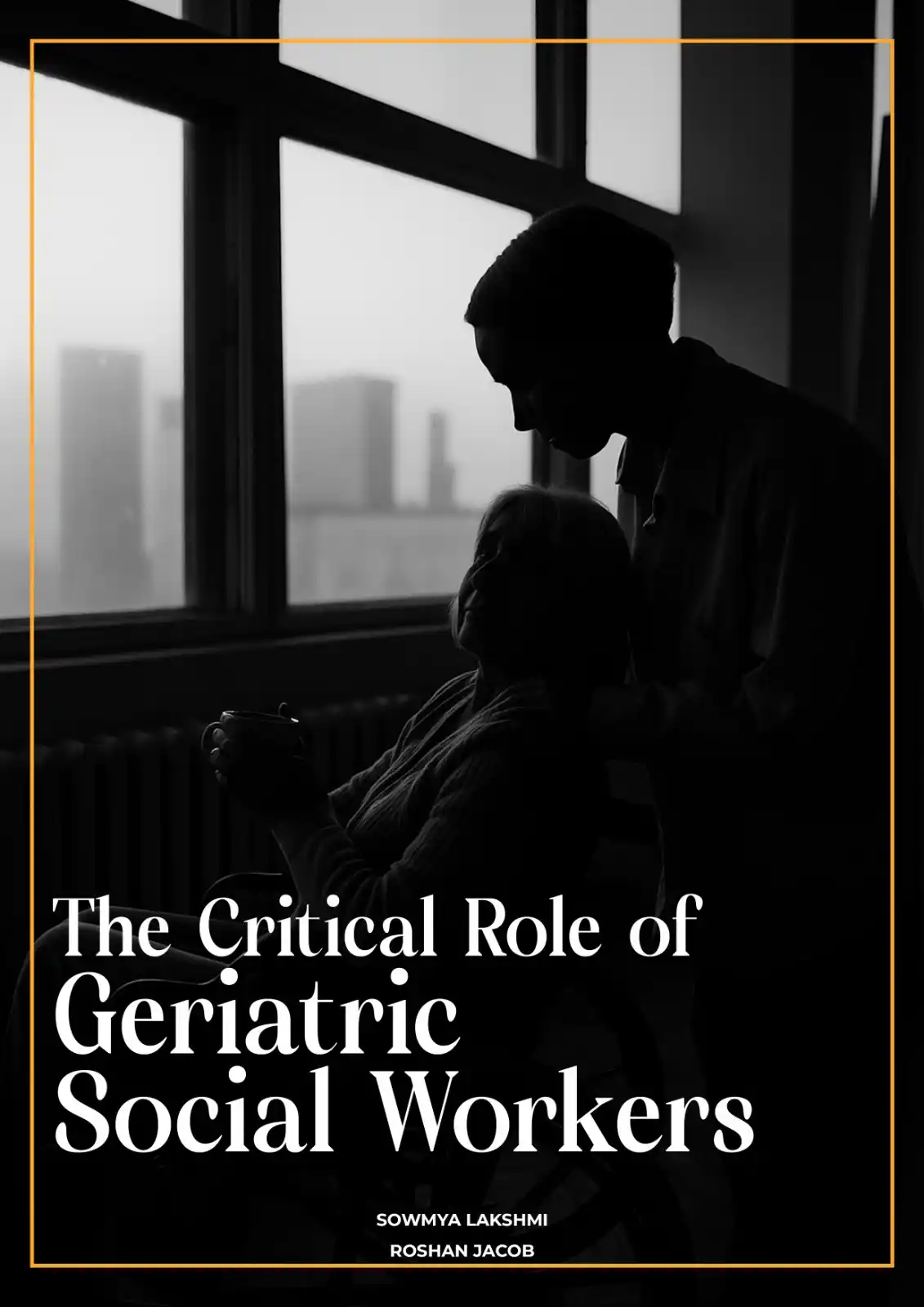These stories of 79-year-old stroke patient Peter and 87-year-old Merrin, recovering from a traumatic injury, highlight the vital role played by geriatric social workers—professionals who are not only educated but also trained through hands-on experience.

When Peter Uncle suffered a stroke at 79 and was left paralyzed, he spent about three weeks in the hospital before being discharged home. His son, who lived in Mumbai, and daughter, who flew in from the U.S., arranged for a male home attendant to look after him. They referred to him as a “home nurse,” but in reality, he had no formal training or understanding of caregiving—he was inexperienced and unprepared.
In their haste to return to their lives, Peter Uncle’s children failed to ensure any proper system of supervision or follow-up care. As a result, he developed painful bedsores and recurrent urinary infections, several of which required hospitalization. Essentially, the responsibility of care was handed over to someone who lacked both the knowledge and the compassion needed for such a role, with no plan in place for daily monitoring or professional oversight.
Peter Uncle’s story underscores a critical gap in elder care—the need for professional assessment, planning, and regular monitoring. Had a geriatric social worker been involved, much of his suffering could have been prevented through coordinated care, proper support, and early intervention.
At age 87, Merrin was living in her own home with her husband. Her husband, who is 91 had early dementia and wheelchair bound and had a full time attendant. One day, while making breakfast, she slipped on a puddle of water on the kitchen floor. The fall was frightening, especially because she couldn’t stand up and the telephone was across the room. She crawled to it and dialed her neighbour. Unfortunate things often happen at the most inopportune times. Husband’s caregiver was away for shopping.
Merrin had sustained a hip fracture and was admitted to the hospital. During her stay, she was visited by Anita, a geriatric care manager and discharge planner from advantAGE Seniors. The visit was arranged at the request of Merrin’s daughter, Ellen, who lives in Chicago and recognized the need for professional support. Anita, who holds a master’s degree in social work, conducted a thorough evaluation. Based on her assessment, Ellen decided to engage advantAGE Seniors to coordinate and monitor the ongoing care of both her parents, relying on the expertise of social gerontology practitioners.
Ellen was certain that her aging parents could no longer manage on their own. With Merrin’s recovery expected to take time, she arranged for the necessary support with daily living activities (ADLs) for both parents. In addition, she engaged social gerontology consultants (advantAGE seniors ) to conduct regular assessments and monitor their well-being—helping to prevent further incidents and ensure appropriate ongoing care.
Anita was familiar with all the community resources and the care aspectsof older adults. She conducted a psychosocial evaluation, which provided information on Merrin’s functional ability, both mental and physical, and her social and supportive network. She wanted a snapshot of Merrin’s life before the fall so she could put in place the resources to allow her to return to normal life as soon as possible. She called Merrin’s daughter Ellen, who lived in Chicago, to determine the availability of family support. As usual like majority of long distance caregivers, Ellen’s job prevented her from devoting a long stretch of time to caring for her mother. Ellen was able to make preparations for the services after the discharge with help of Anita.
Knowing Anita a bit is also important. During her Masters in social work, she initially considered specializing in child welfare, drawn by the abundance of job opportunities. But a professor she deeply respected encouraged her to explore the field of aging. Though hesitant at first—believing that working with older adults might be emotionally heavy—Anita gave it a try. What she discovered surprised her: a deep sense of purpose and fulfillment in helping improve the quality of life for older adults like Merrin. After graduating, she joined advantAGE Seniors as a geriatric care manager and discharge planner, drawn to the organization’s leadership in the field of social gerontology.
Both case studies—Peter Uncle and Merrin Aunty—highlight the importance of geriatric social workers or social gerontology managers like Anita. In Peter Uncle’s case, there was a lack of foresight, and his children failed to recognize the need for professional support and monitoring from social gerontology experts. In contrast, although living far away, Ellen understood the value of having a geriatric care manager to oversee her parents’ well-being.
In 2012—thirteen years ago—advantAGE Seniors organized eight international seminars on Social Gerontology, bringing together leading experts from the US, UK, and Ireland. At the time, Gerontology—particularly Social Gerontology—was virtually unheard of among students of social work and nursing. It was absent from undergraduate curricula and unavailable as a specialization at the master’s level. As practicing social gerontologists, we saw a pressing need to expose both students and faculty in social work and nursing to this emerging field. These seminars were our response to that gap—a pioneering effort that marked the first formal introduction of Social Gerontology in India and a milestone achievement for advantAGE Seniors.
To advance the field, we reached out to several universities and IIMs about launching faculty development programs in Social Gerontology. However, the response at the time—fifteen years ago—was largely indifferent. The most common feedback was a lack of qualified faculty and limited employment opportunities in the field. Additionally, funding constraints posed a significant hurdle.
It was a classic Catch-22: unless a student entered a social work program already interested in aging issues, there were few opportunities to develop that interest further. A study in US, by the John A. Hartford Foundation in 2000 highlighted the gap—less than 10% of faculty across 117 graduate social work programs in the U.S. had formal training in aging. That same year, out of 300 social work doctoral dissertations, only 7% focused on geriatric social work.
Geriatric social work has emerged as one of the top 20 career fields with strong growth potential, largely due to the rapid expansion of the older adult population. This demographic shift is driving a significant increase in the demand for social workers equipped with specialized knowledge, skills, and values in geriatric care. Contributing to this trend are changes in healthcare delivery, such as shorter hospital stays and the rising need for coordinated care during discharge transitions. These infirm elders need continued support in the home setting or in a care setup. These developments underscore the vital role of geriatric social workers and care managers in maintaining continuity of care and enhancing the quality of life for older adults.
In India, while the Union Government and various state governments have Social Welfare Departments, their role in supporting the elderly remains minimal. These departments typically offer only a small pension, operate helplines for older adults in select areas, and provide limited funding to a few NGOs running old age homes. Despite the presence of District Social Welfare Officers, most lack training in geriatric social work and primarily handle administrative duties. There are no designated officers specifically trained in elder care or social gerontology. In fact, during a recent interaction, one such officer admitted he had never even heard of the term “social gerontology.” Overall, the system intended to support the elderly is deeply inadequate, with most initiatives existing only on paper.
In India, while the Union and State Social Welfare Departments are nominally responsible for elder care, their impact remains limited and fragmented. Current provisions include woefully inadequate pension disbursements, namesake helplines in select districts, and minimal support to NGOs running underfunded old age homes. Most District Social Welfare Officers lack specialized training in geriatric social work and are instead burdened with routine administrative tasks. Shockingly, some have never even encountered the term “social gerontology,” highlighting a profound gap in awareness and expertise. Without trained personnel or a cohesive policy framework, most government schemes for the elderly exist only on paper, with little to no real-world implementation or impact.
As India aspires to become a $5 trillion economy, it must not overlook the very generation that laid its foundation. The elderly population includes former farm labourers, truck drivers, pourakarmikas, shop attendants, private sector employees, small time agriculturists and countless others who contributed silently and steadily to the nation’s growth. Many worked in informal or unorganized sectors, with no retirement benefits or safety nets to fall back on. It is not merely a moral obligation but a policy imperative for the government to ensure that these citizens are supported with dignity in their later years. This calls for a comprehensive and well-funded national eldercare strategy that includes trained social gerontologists, accessible healthcare, long term care, and community-based support systems.
The acute shortage of geriatric social workers in India stems from several interrelated factors. One of the primary reasons is the chronic underfunding of gerontology, which has led many social work scholars and doctoral students to pursue careers in better-funded areas such as women and child welfare. This lack of investment has also diminished the academic prestige of geriatric social work, making it less attractive to both students and institutions. Furthermore, pervasive ageist stereotypes and the misconception that working with older adults is neither intellectually stimulating nor professionally rewarding have further discouraged specialization in this field. However, with adequate government grants and funding support, universities could develop robust programs in social gerontology—training faculty, offering specialized bachelor’s and master’s courses, and ultimately creating a stronger pipeline of qualified geriatric social work professionals.
Artificial Intelligence (AI) has undeniably transformed numerous sectors, including healthcare, by enhancing diagnostic accuracy, streamlining workflows, and enabling personalized treatment plans. From predictive analytics in patient care to robotic-assisted surgeries, AI has accelerated progress and efficiency. However, when it comes to ageing and social gerontology—a field rooted in human connection, empathy, and complex social dynamics—the integration of AI presents unique challenges. These areas demand not just clinical insights but a deep understanding of emotional, cultural, and psychosocial factors that shape the ageing experience.
In the near future, the role of AI in ageing and social gerontology may remain limited, not due to technological incapacity, but because of the deeply human-centric nature of elder care and social engagement. While AI can support administrative tasks, assistive technologies, or early detection of cognitive decline, it cannot replace the nuanced human interactions that are central to gerontological practice. Empathy, active listening, and trust-building—key to working with older adults—are qualities that AI has yet to convincingly emulate. Thus, the core of social gerontology will likely continue to rely on human professionals, with AI serving as a supplementary, rather than central, tool.
“The country must act now to address the growing care needs of its aging population by encouraging universities to introduce academic programs in social gerontology,” urged panelists at the 2012 seminars organized by advantAGE Seniors. These seminars brought together global experts in gerontology from diverse disciplines, all sounding a clear warning: without timely intervention, the expanding ranks of older adults will face a shortage of care providers adequately trained in geriatrics and geronyology—ultimately compromising the quality of care they receive. In 2025, little has changed—caregivers across the country still lack formal training or essential skills to properly care for infirm seniors.
Aging-savvy social workers act as crucial guides and facilitators, helping older adults and their families navigate the often overwhelming landscape of health and social services. They empower families to make informed choices, offer counseling and direct support, foster family involvement, and coordinate care across professional systems.
Despite the rising demand for gerontology expertise, too few social workers are entering this vital field. As the older adult population grows, this shortage poses a serious challenge—one that requires urgent government intervention to prevent a looming care crisis.
It calls for government action.
